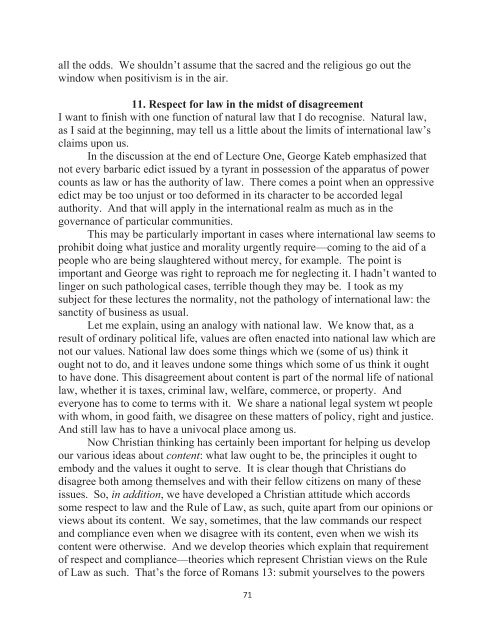International Legal Evangelism: Intelligence, Reconnaissance & Missions
International Legal Evangelism: Intelligence, Reconnaissance & Missions
International Legal Evangelism: Intelligence, Reconnaissance & Missions
You also want an ePaper? Increase the reach of your titles
YUMPU automatically turns print PDFs into web optimized ePapers that Google loves.
all the odds. We shouldn’t assume that the sacred and the religious go out the<br />
window when positivism is in the air.<br />
11. Respect for law in the midst of disagreement<br />
I want to finish with one function of natural law that I do recognise. Natural law,<br />
as I said at the beginning, may tell us a little about the limits of international law’s<br />
claims upon us.<br />
In the discussion at the end of Lecture One, George Kateb emphasized that<br />
not every barbaric edict issued by a tyrant in possession of the apparatus of power<br />
counts as law or has the authority of law. There comes a point when an oppressive<br />
edict may be too unjust or too deformed in its character to be accorded legal<br />
authority. And that will apply in the international realm as much as in the<br />
governance of particular communities.<br />
This may be particularly important in cases where international law seems to<br />
prohibit doing what justice and morality urgently require—coming to the aid of a<br />
people who are being slaughtered without mercy, for example. The point is<br />
important and George was right to reproach me for neglecting it. I hadn’t wanted to<br />
linger on such pathological cases, terrible though they may be. I took as my<br />
subject for these lectures the normality, not the pathology of international law: the<br />
sanctity of business as usual.<br />
Let me explain, using an analogy with national law. We know that, as a<br />
result of ordinary political life, values are often enacted into national law which are<br />
not our values. National law does some things which we (some of us) think it<br />
ought not to do, and it leaves undone some things which some of us think it ought<br />
to have done. This disagreement about content is part of the normal life of national<br />
law, whether it is taxes, criminal law, welfare, commerce, or property. And<br />
everyone has to come to terms with it. We share a national legal system wt people<br />
with whom, in good faith, we disagree on these matters of policy, right and justice.<br />
And still law has to have a univocal place among us.<br />
Now Christian thinking has certainly been important for helping us develop<br />
our various ideas about content: what law ought to be, the principles it ought to<br />
embody and the values it ought to serve. It is clear though that Christians do<br />
disagree both among themselves and with their fellow citizens on many of these<br />
issues. So, in addition, we have developed a Christian attitude which accords<br />
some respect to law and the Rule of Law, as such, quite apart from our opinions or<br />
views about its content. We say, sometimes, that the law commands our respect<br />
and compliance even when we disagree with its content, even when we wish its<br />
content were otherwise. And we develop theories which explain that requirement<br />
of respect and compliance—theories which represent Christian views on the Rule<br />
of Law as such. That’s the force of Romans 13: submit yourselves to the powers<br />
<br />
71

















